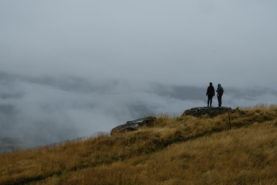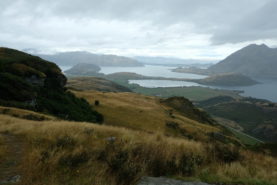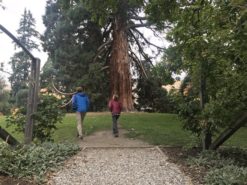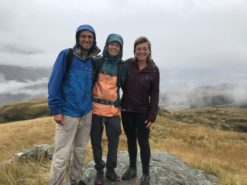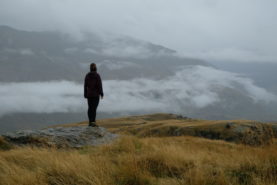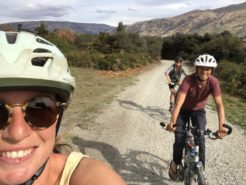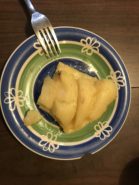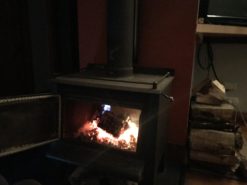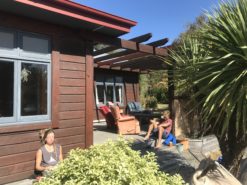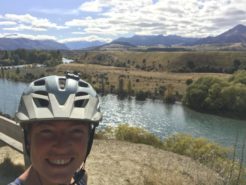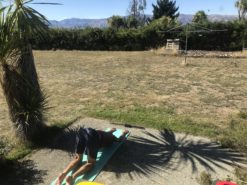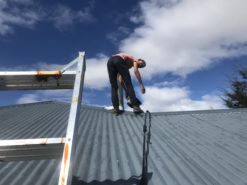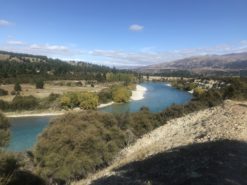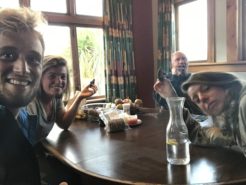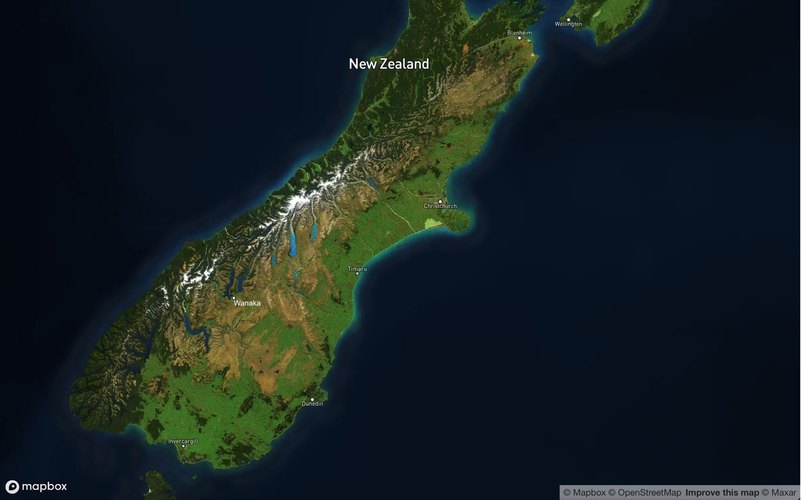On March 1st 2020, we flew into Queenstown, New Zealand. Although the coronavirus was already making headlines, New Zealand was still relatively carefree, just having one confirmed case. We ostracized the situation a bit too; New Zealand is so far from the rest of the world and so lightly populated (at least the South Island) the virus will most likely not pose a severe and direct problem for either the country or our travel. After 2,5 weeks of relatively carefree cycling, we now find ourselves in a near-full lockdown in Wanaka due to the covid-19 crisis. Things evolved extremely fast here and naturally our entire plan has changed. Below is a short recap of the last week for us, describing day-to-day how the virus containment measures got more stringent and severe.
Thursday March 19th
We just arrived in Wanaka and needed to find Wi-Fi somewhere in town. We had not had internet over the last four days as a SIM card was a bit too expensive for our budget so we were reliant on public Wi-Fi for information and route planning. The plan was to head to Ester, a young Dutch woman living and working in New Zealand for a year. Ester had responded to a message we put in a Facebook group, where we asked people if we might camp in their garden. So far in New Zealand, we had only done camping on (free) camp sites or wild camped in some places. While we loved being out in nature again, without the crowds we quite regularly had in Asia, we also felt we were missing out on connecting to people here, on learning more about a country and about life here. New Zealand is a developed country, and cycling is wildly popular. Nowhere else did we see as many other cyclists as here. But, possibly as a consequence of the former, we noticed less spontaneous interaction with locals than we had had in other countries. By camping in people’s garden, we hoped to have a little bit more interaction with locals. Ester rents a room in a house with some other internationals who are (temporarily) working in New Zealand. The house has a big garden, plenty of space for us to pitch our tent and we were welcome to stay a few nights.
We planned to stay two nights and spend a rest day around Wanaka. Arriving in Wanaka, we decided to go straight to the supermarket and do a bit of groceries already for the next leg of our trip. Groceries are quite expensive in New Zealand, especially in the smaller towns. So to limit our expenses, we had been doing bulk groceries in the bigger cities in an attempt to avoid the expensive smaller shops. Life on the streets seemed normal, as if nothing was going on. The supermarket was the first place we noticed some minor changes. There was a hand sanitizer dispenser at the entrance instructing people to sanitize their hands before and after shopping, and some of the shelves were empty. Especially foods with a long expiry date, such as oats, lentils and milk powder were not available, just the things we often buy too as they are good cycling staples.
At this time in the Netherlands, the number of cases of COVID-19 were way higher already, our family and friends were working at home if possible. In the news, we saw alarmingly fast rising number of cases in European and Asian countries. There were talks of nationwide lockdowns in various places over the world.
We replied to questions from our family and friends saying things were still pretty normal here, not much out of the ordinary. It felt weird, watching all the misery happening at home while we were on our bike ride and would be cycling again in a few days. New Zealand reported 28 confirmed cases in total this day, of which most on the North Island and we were on the South. Only 3 to 8 cases were added daily. Nothing compared to the numbers (hundreds of new cases in most countries) we were reading about in Europe, so we still felt quite relaxed about it all, except some minor disappointment that we couldn’t get our beloved staple foods like oats and lentils.
We set off to meet Ester at her work and headed to her house. The house was beautifully situated, on the outskirts of Wanaka, a town of only around 12.000 inhabitants but seeing a very large tourist influx both summer (beautiful hiking) and winter (best skiing in NZ). The house was nearly all wooden, one story high, with a large veranda, fireplace and indeed, a huge garden. We quickly set up our tent, and together with another friend of Ester, enjoyed a lovely evening together over many many cups of tea.
That night, we noticed on social media a rising number of cyclists – some of whom we had met on this trip and some we had been in touch with but never met – who got stuck somewhere due to travel restrictions or felt safer to return home. Our friends Sarah and Pedro (@homeiswhereyoubikeis), who were supposed to fly from Vietnam to Japan the next day, had decided to change their flight and fly to Sarah’s brother in Melbourne instead. A few hours after they booked their flights, Australia decided to close their borders for non-residents as of the following day, so they couldn’t go on that flight anymore. Slap-bang they had no other option than to book a flight back to Portugal, as their visa was about to expire. Such a miserable situation and a tragic example of how fast measures were implemented, having enormous impact on travellers’ plans. For us though, those matters still felt miles away…
Friday March 20th
We woke up with the bright sun on our tent, after a fresh night. Ester had to work, we would meet her later on. We took it slow in the morning, skyped with family members and we got an e-mail from the airline stating our flight to Japan had been cancelled. We had originally planned to stay in NZ for two months and then fly out to Japan. Our latest exciting plan involved going from Japan to South Korea and then to Mongolia, go back to Europe with the Trans-Siberia train and cycle from Helsinki home through Europe. Over the last few days, we had talked a lot about Japan, and we already felt that it was no longer a good idea to go. The airline just made the final decision for us, and we recalibrated by staying in New Zealand for a longer period. There was still so much to explore here, that we didn’t even feel too emotional about this change of plans.
Now that that the flight was off, any time pressure to get to the North Island was gone too, and we decided to take it a bit slower and stay an extra day in Wanaka. Then on Sunday, we would continue cycling via the West Coast region towards our Kiwi friends near Nelson. We baked our long craved for flapjack and cooked a nice meal for Ester. By chance, on this day, all her other housemates moved out of the house, either to go back to their country or to another flat, so the house turned nice and quiet.
Saturday March 21st
In the afternoon New Zealand’s Prime Minister Jacinda Ardern gave a press conference, announcing that in New Zealand too, restrictions to contain the virus were coming into action, Level 2 on a scale of 4. Among the restrictions was also to “limit all non-essential travel”. But what did that mean for us? While on the road, we had had little close interaction with people, most of the time on campsites or wild camping we enjoyed being in our own bubble away from other tourists. What risk would we really be to others? Most likely, every person in this world must have had this thought related to a specific action over the last few weeks. In some way, we felt more safe on the bike than in a town, as human interactions on the road were easier to avoid than living in a town. However, although we were not so much concerned about getting ill ourselves, the last thing we wanted to be was a potential vector and spread it to others. We might not be sick, but studies show you can still spread it to others.
Morally the choice of either continuing or pausing the trip was eating at us. It did not feel right to be happy cycling and pretending nothing was going on. It would not be a good example to others. To put our minds off it a little, we decided to go for a walk in the mountains around Wanaka. Although it was a gloomy rainy day, the walk made us realize a few things: A. Wanaka is absolutely stunning, the scenery, the clouds, the colours, it really is a little gem that we had nearly missed out on. B. being outside in nature and exercising is one of the best things to do to take your mind of things. We were wet and cold to the bone by the end of the hike, but with lifted spirits. We decided to sleep another night on the decision whether or not to continue cycling towards our friends. More and more people in the cycling community were posting messages that they couldn’t continue cycling and were forced to go home.
Sunday March 22nd
After a night of frankly very bad sleep, we decided to pause the cycling for now and think about options where we could stay for a longer time. We both felt a bit unnerved, because we had been taking in so much news and things were changing very rapidly here. Airlines were cancelling their flights, more and more countries were closing their borders, even for transits. New Zealand’s borders were now closed for foreigners too, and it was likely that somewhere on the way we would get stuck if we decided to leave. The nightmare scenario we really did not want was to get stuck during transit in Singapore or Dubai. Moreover, flight tickets to Europe were hardly available and people were paying over €4000,- in their panic to get home.
What did we want to do? Not trying to get home now meant a considerable chance that we would be “stuck” in New Zealand for months, not weeks. In a country we hardly knew, where we had little people to fall back on if things would go wrong. We’d be far away from our family and friends. But then again, we couldn’t see most of them even if we went back due to the near-lockdown situation back home. Also, we planned to be away for a couple more months anyway and our house was sublet until September, so where would we stay? Honestly, it was not a very difficult decision. We would stay in New Zealand and make best of our time here. Still, we would be lying if we said the choice of flying home or not did not occupy our minds afterwards. Even now as we write this, we sometimes wonder about the matter. But we still feel like staying, even for a few months.
However, we did need a proper plan for the coming period. We both realised that the restrictions would probably be scaled up fast. New Zealand had one big advantage over other countries and that is that COVID-19 reached its shores later than Europe. They had time to look at other countries to see which restrictions worked and which not and if the government was smart, they would try to contain the virus early on. In a way, we actually hoped they would act fast and “hard”. It was the right thing to do for the country and by hitting the virus hard on the head, the most stringent measures might only be in place for a limited time only, and not drag on for months (like probably will be the case in Europe). We were even making jokes about how New Zealand’s South Island might be the world’s only corona-free region in the world and, as long as the borders remained closed, we could roam it freely. Quickly hovering back into reality, we of course knew hard measures would make things very difficult for us, since we were still dependent on Ester’s hospitality. Getting to our friends in Nelson was getting harder by the day due to travel restrictions and limited public transportation options. We felt the clock ticking and our next idea was to look for a place where we could do a bit of work on farms in exchange for a place to stay.
Monday March 23rd
We decided to put all effort in finding a place to work and stay for a while as soon as possible. Through all channels we sent out messages asking if people knew a place for us: Facebook, Instagram, family, friends, people we met on the road, people we stayed at before, the WWOOF website, name it. All morning and a big part of the afternoon we were busy sending out messages and working on the answers. In the end we had quite a few positive responses, in different areas of the country. It was exactly then that the landlord of Ester’s house informed us that the Prime Minister was about to give another press conference. We both felt it coming and indeed: NZ would immediately move on to a Level 3 in restrictions and within 48 hours to Level 4, which effectively meant a national lockdown. We both entirely supported this, but the clock was now ticking even faster. In two days, all public transport would be closed! And even before that, probably fully booked by others wanting to get home as soon as possible.
Like a gift from heaven, our rescue in the end came from very close. Our dear British landlord, Neil, popped by again shortly after the announcement to tell us we could stay here and sit it out for a while. A huge burden immediately fell from our shoulders. We could move into a room in the house, so we did not have to move or use public transportation. We had a place to stay! In fact, Neil would move in with Ester and us in another room of the house, because his own house would be used to self-isolate another guy that lives here but had shortly been back to Brasil to visit family. So there would be four of us together in the house, getting through the lockdown together.
The lockdown came into effect in the night from Wednesday to Thursday. Everything has been closed for a few days now, except for the essential stores. Fortunately, Wanaka is a small town but has two very large supermarkets to cater for all the tourists. As there hardly are any tourists now, the supermarkets are stocked quite well and there’s little panic buying going on. (Especially important for Tom as he gets hangry fast, so having food in the house is essential for all persons around). Everyone seems to handle the situation pretty well here. Life on the street is quiet, people are urged to stay at home. We are allowed to go out for groceries or for a little bit of exercise, but not anything else. Going on long hiking trips is forbidden. Campsites are closed, at least for people who don’t have a toilet in their vehicle or tent.
How have we been since lockdown?
Actually, pretty good! We are in very good company of Ester and Neil. Neil turned out to have travelled and worked in India and Pakistan for a while and has done a few cycle trips himself. Ester has had awesome ideas to do and things to bake while we stay at home.
We have kept ourselves busy by cooking and gardening mostly. Neil grows pears in the garden, so we have made a few tarte tatins already. We have cycled a bit, have gone on short walks and runs to explore a bit of the neighbourhood. We have made a bucket list with things we want to learn or do within the next few weeks (you know Tom, always a list of everything ;)). We have helped Neil a bit in the garden, read books and have been editing our videos and writing blogs. Something we will continue to do in the next weeks as we have quite some catching up to do. Sabine has been looking at options to help out here, being a medical doctor. We try to not watch the news too much and to just be here. Spontaneous ideas to do pop up all the time.
We count ourselves extremely lucky for a number of things. First of all, the fact that we happened to be in NZ when things got really serious with COVID-19. In most other countries, we either could not have stayed for a while due to visa issues, limited health care systems or we would not have felt safe staying. We have seen a lot of positive things happening, people inviting strangers into their homes etc. In quite a few countries, we have also read and heard stories of hostility towards travellers. In New Zealand generally the vibe is still positive.
We also feel lucky that within New Zealand, we got stuck here in Wanaka. Surrounded by a beautiful lake, the intensely blue Clutha river and high mountains (with the first layers of fresh snow on them!) all around us, this is a magic place to sit still for a while. We feel lucky that we got to meet and to get to know Ester and Neil, two awesome people. Being in a country that is not our own in this acute situation, we have been dependent on other people’s hospitality. They have taken us in without hesitation and we can’t thank them enough.
Lastly, we count ourselves extremely lucky to have been able to make this trip so far. Being able to live and move as freely as we have done over the last year on our bike is not a given good and it should not be taken for granted. A lesson COVID-19 definitely has taught us already. Being stuck gives us a chance to let the trip sink in, to process what we have achieved and experienced on our bike trip. How incredibly beautiful mother Earth is and how good people generally are. Considering all circumstances, we are feeling optimistic. We hope we can continue cycling in New Zealand at some point not too far ahead, but of course our trip is of very relative meaning compared to the health of people.
The coming weeks/months are uncertain of course, as for everyone. We can only hope that by working together and following the rules, the damage of COVID-19 will be limited. On the other hand, COVID-19 could also provide new chances on this planet, and we are in a way curious to see what good can come out of it. Closer ties with family? People finding new priorities in their lives? A fairer and regenerative economic system? Investing in solid healthcare, climate neutral innovations and pause the pursuit of everlasting growth? Who knows. For now though, priorities should be on containment of and victory over this stubborn little virus. So be strong, remain positive and stay safe (at home if possible ;)).
Talk to you soon,
Tom and Sabine







